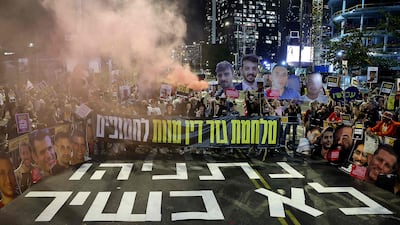Live updates: Follow the latest on Israel-Gaza
Barely a day after ending the Gaza ceasefire with a massive bombing campaign on the strip, Israeli Prime Minister Benjamin Netanyahu has secured a number of personal victories that help to shore up his political future in the months ahead, stoking an impression among many critics that he is renewing the war for his own gain.
Despite significant domestic opposition, condemnation from key allies – but crucially not the US – and the social and economic toll a renewed military campaign will have on a country exhausted after more than a year of war, Mr Netanyahu vowed to step up attacks after Tuesday's bombardment. It killed more than 400 Palestinians in one of the deadliest assaults since the early days of the conflict.
“From now on, Israel will act against Hamas with increasing intensity … negotiations will only take place under fire,” he said, connecting his decision to stalled talks over the return of 59 hostages, most of them Israeli, from Gaza.
Mr Netanyahu did not mention that the offensive also allowed him to cancel giving testimony during his corruption trial, bring back a far-right minister who represents an important bloc in the governing coalition, and to dodge public anger about his attempt to fire the director of Shin Bet, Ronen Bar, all key victories that set him on track to pass the state budget at the end of the month. If he fails to do so, the parliament would be dissolved and new elections called.

“Many Israeli citizens asked themselves the awful question: was the resumption of the fighting in Gaza and the collapse of the ceasefire by Israel done for operational security reasons or perhaps for reasons related to the political survival of Netanyahu?” commentator Avi Issacharoff wrote in the Yedioth Ahronoth newspaper on Wednesday.
The prospect of renewed fighting in Gaza reignited a protest movement calling for the government to prioritise the release of the hostages. The protesters, who say Israeli bombardment and the breakdown of negotiations with Hamas for their release puts the captives' lives in danger, are now also openly accusing the prime minister of advancing his own goals at the expense of the country.
On Wednesday, several thousand demonstrators marched down a motorway towards Mr Netanyahu’s official residence in Jerusalem, where they planned to set up a tent camp. Scuffles broke out with police, as protesters tried to break through barriers chanting “democracy” in Hebrew, a refrain from the mass protests against judicial reforms proposed by the government that gripped the country before the war was triggered by Hamas's attack in October 2023.
The new demonstrations have attracted leading figures in Israeli security circles. At a rally in Tel Aviv on Tuesday, former Mossad chief Tamir Pardo described the prime minister as “dictator Netanyahu”.
“You, the suspect Benjamin Netanyahu, pose a clear and present danger to the nation’s security,” he added, hinting at the years-long corruption trial Mr Netanyahu has been battling.
After finally taking the stand at the end of last year, Mr Netanyahu has been trying to delay his court appearances, often citing security concerns. Tuesday’s fighting allowed him to do exactly that.

It also allowed him to get National Security Minister Itamar Ben-Gvir and his party back into the coalition, despite the attorney general advising that to do so was not legally sound. Mr Ben-Gvir, a far-right leader convicted of terror charges, left the coalition in protest at January’s ceasefire agreement. He was also reportedly pleased by the attempts to fire Mr Bar.
Mr Ben-Gvir’s re-entry came a day after the coalition reached an agreement with him for his party to abstain from voting on the first bill in the upcoming state budget, giving the government a comfortable majority. Passing the budget without his support would have been almost impossible, given threats from ultra-Orthodox coalition members to vote against the government if young men in their community are not exempted from military service, a demand that is deeply unpopular throughout Israeli society.


